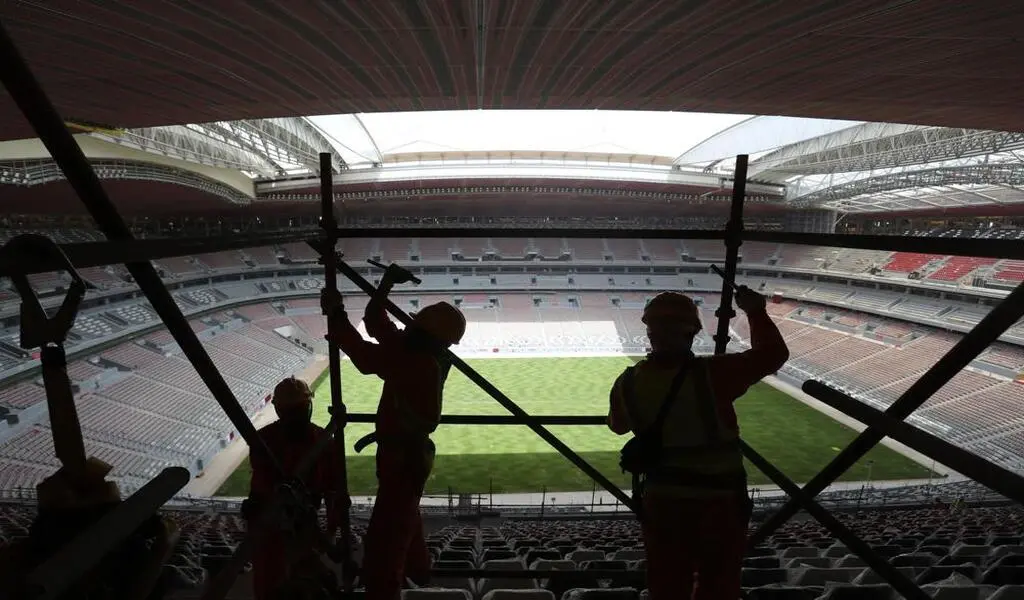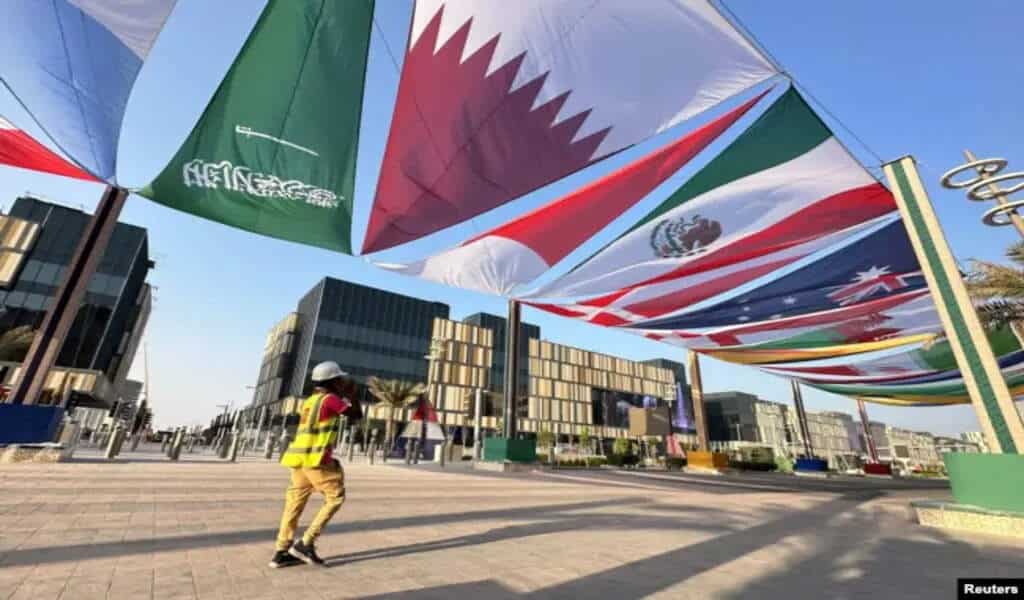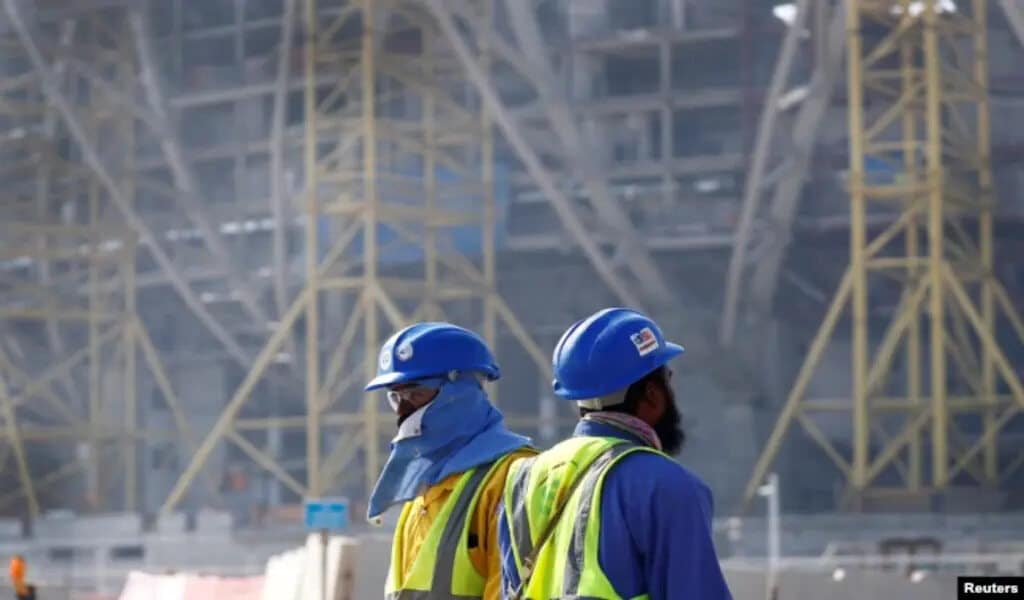News Asia
Qatar Workers’ Safety at risk as World Cup Spotlight Dims

(CTN NEWS) – Qatar’s World Cup is just days away, and rights groups fear addressing the widespread exploitation of foreign workers might be too late.
As the World Cup approaches this month, the treatment of millions of foreign workers in the Gulf Arab nation has been under unprecedented scrutiny.
They are building stadiums and other infrastructure and will work in hotels and sweep the streets during the event.

FILE – Country flags are seen along a street in Lusail, Qatar, Oct. 22, 2022.
Qatar has enacted a series of reforms in recent years, including dismantling a system that tied workers to their employers and enacting a minimum wage – reforms praised by the UN and rights groups alike.
Workers – barred from organizing unions or striking – have few realistic avenues to seek justice in one of the hottest countries on Earth because of unpaid wages and harsh working conditions.
Employers are also worried about what happens after the month-long tournament ends in December when the international spotlight moves on.
Qatar has placed itself at the forefront of labour reforms in the region, and progress is expected to continue after the World Cup.
Emiri officials have slammed critics for ignoring reforms and unfairly singling out the first Arab or Muslim nation to host the World Cup.
Qatar is home to millions of foreign workers – from highly paid corporate executives to construction workers – who make up the majority of the population and nearly 95% of the labor force.

FILE – Workers walk towards the construction site of the Lusail stadium which will be build for the upcoming 2022 Fifa soccer World Cup during a stadium tour in Doha, Qatar, Dec. 20, 2019.
“Kafala” is a system that tied workers to their employers and prevented them from quitting or changing jobs without permission, which has been dismantled in Qatar.
However, according to rights groups, many aspects of that system still exist in an informal, more informal manner.
Many workers incur debt even before arriving at their first job because they have to pay exorbitant recruitment fees. Employees who quit can still be reported for “absconding,” a criminal offence.
According to Michael Page of Human Rights Watch, “there is a genuine risk that migrant workers won’t get their money back if they walk away from a job that hasn’t paid them for several months.”
Earlier this year, the London-based labour rights organization Equidem published a lengthy study detailing abuses in more than a dozen World Cup hotels.
It claims workers from Africa and Asia are subjected to sexual harassment, discrimination, pay theft, and dangers to their health and safety.
According to Ella Knight, a researcher at Amnesty International in London, many immigrants employed as security guards or domestic workers endure months or even years without taking a day off.
Despite the fact that rules require at least one such day each week.
Employers are simply not being held accountable or fined in a way that stops abuses from happening again, she said, because “impunity remains a significant problem.”

A general view of the Hamad International Airport ahead of FIFA 2022 Worldcup, in Doha, Qatar, Nov. 2, 2022.
Qatari legislation prohibits employees from joining unions or organising rallies, and the government severely limits media access to workers.
At least 60 workers who went on strike in August over unpaid salaries were detained by police. Two Norwegian journalists were detained last year while covering migrant workers.
Before fleeing the country last year, Malcolm Bidali, a Kenyan security guard who had blogged anonymously about the suffering of employees, was imprisoned for three months, including 28 days in solitary confinement, and fined $6,800.
In a piece about his experience, he claimed that while Qatar’s changes “look fantastic” on paper, the reality is different, with officials appearing more eager to stifle opposition than punish abusive bosses.
He commented, “I can’t help but wonder what’s in store for migrant labourers after the World Cup.”
“What happens when no one is looking if workers still live in appalling conditions, still go months without pay, still can’t easily switch employment, and still can’t achieve justice for domestic workers?”
After the World Cup, Qatar promises to keep up its changes and protect the well-being of its workforce.
In a statement, Ali Al-Ansari, Qatar’s media attache in the United States, stated, “Qatar has always accepted that work remains to be done, particularly to hold dishonest employers to account – as is the case with any country throughout the world.”
“We are already noticing fewer offences each year as employer compliance grows.”
Labour rights advocates claim Qatar still owes money to people who worked on World Cup infrastructure projects beginning with the tournament’s award in 2010 — years before the changes were implemented.
According to Amnesty, authorities did not look into worker deaths during that time.
Amnesty International and other rights organizations are pleading with FIFA, the organization that governs soccer, to create a $440 million fund to pay workers.
This request has the backing of several federations. The international soccer governing body has acknowledged it is open to the notion.
Al-Ansari stated that Qatar’s own fund, which Al-Ansari said had distributed almost $270 million this year alone, was established in 2018 to compensate workers who suffer workplace injuries or are not paid.
He made no direct remarks on the demands for a bigger redress fund.
Human Rights Watch’s Page claims that the hefty compensation by Qatari authorities, which only cover claims from more recent years.
And this highlights the need for a larger fund to address the “extremely egregious abuses” that occurred in the years before the implementation of the reforms.
“If this is their position now when the heat of the limelight is on them, what will their attitude be after the World Cup, when the spotlight is off of them, in terms of changes and migrant worker protections? The Qatari governments.”
“I genuinely think that’s disturbing,” he stated.
Related CTN News:
Japan Hosts a Multilateral Display of Naval Unity Amid Tensions in East Asia
Morbi Bridge Collapse Leaves Over 130 Dead in India, Rescue Operations Under Way
Watch Fire Stunt Turns Horribly Wrong, Stuntman’s Beard Burns Up in Flames






























